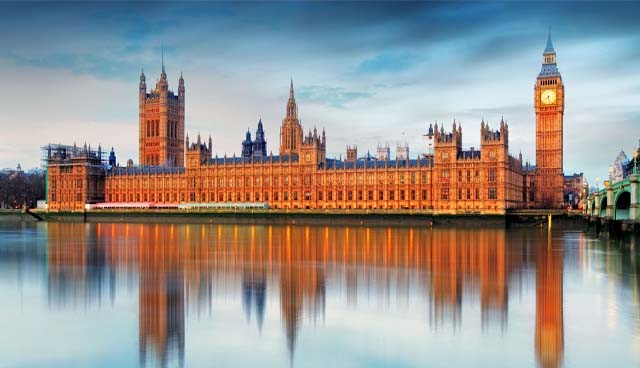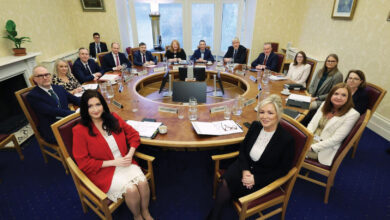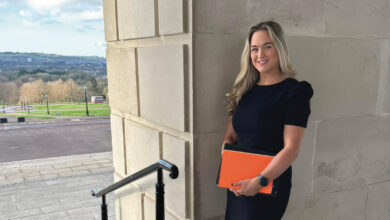Private Members’ Bills in Westminster

In June, SDLP MP Colum Eastwood brought forward a Private Member’s Bill in Westminster, becoming only the second Northern Ireland MP to do so 2021. David Whelan looks at the bills coming forward and the Westminster process.
At the end of August, only two of the 153 bills before Parliament were introduced by Northern Ireland MPs.
Currently, just 1.3 per cent of Bills before Parliament which originated from the House of Commons, are from Northern Ireland MPs, despite them making up almost 3 per cent of the Westminster’s MPs (this includes Sinn Féin, whose seven MPs to not take their seat).
Eastwood’s Climate Change Bill, which is not scheduled to have its second reading until 10 December, is aiming to force the UK Government to declare a climate emergency, create environmentally friendly jobs and create a corporate responsibility tax to tackle climate change.
The Bill was brought forward as a Ballot Bill, a different process than that which was brought forward by the DUP’s MP for Strangford, Jim Shannon. Shannon introduced the Automated External Defibrillators (Public Access) Bill on 21 June 2021 as a Presentation Bill, having previously introduced the Bill as a Ten-minute Rule Bill in December 2020, only to see it fail to complete its passage through Parliament.
Shannon’s Bill aims to ensure a requirement for the installation of automated external defibrillators in public buildings, sporting facilities, schools, higher education and other education and skills facilities, and facilities that provide care to vulnerable people; and to make associated provision about training and signage.
The 2021/22 session started with the State Opening on 11 May 2021.
A minority of Private Members’ Bills (bills introduced by MPs and Lords who are not government ministers) become law, but even those bills that do not become law have been acknowledged as having indirect effect on legislation.
In Westminster, like other public bills, Private Members’ Bills can be introduced in either the House of Commons or the House of Lords, but all must go through all stages and with less time allocated to such bills, the likelihood of the progressing through all stages is decreased.
Outside of the two Private Members’ Bills introduced in the House of Commons this year, Chairman of the DUP, Maurice Morrow, introduced the Digital Economy Act 2017 (Commencement of Part 3) Bill [HL] on the 9 June 2021, seeking to bring into force the remaining sections of Part 3 of the Digital Economy Act 2017. A date has yet to be announced for the Bill’s second reading.
Ballot
In the House of Commons, three ways exist to introduce a Private Members’ Bill. The one that tends to be the most successful are Ballot Bills, as utilised by the SDLP leader Eastwood. On the second sitting Thursday of each parliamentary session, names of MPs applying for a bill are drawn in a ballot, with the first seven most likely to get a day’s debate. Formal presentation of a Ballot Bill, with no debate, usually takes place on the fifth sitting Wednesday of a parliamentary session.
Ten-minute rule
A second method for introducing a Private Members’ Bill for MPs, and utilised originally by the DUP’s Shannon, are Ten-minute Rule Bills. These often manifest as an opportunity for MPs to raise and speak about an issue rather than a serious attempt to get a bill passed. Members are allowed a speech of no more than 10 minutes to outline their case for a bill, but this can be challenged with a speech in opposition of a bill. The House then decides whether the Bill should be introduced.
Presentation Bill
A Presentation Bill, as is being utilised by Shannon currently, can be introduced by any member if they give prior notice of their intention to do so. MPs introduce Presentation Bills by title only and cannot speak on them, meaning they rarely become law.
For 13 Fridays of each session, Private Members’ Bills have precedence over government business and on the first seven Fridays allotted to Private Members’ Bills, precedence is given to Ballot Bills.
However, while MPs can list their Private Members’ Bills for any day, which is common when no sitting Fridays remain, they are unlikely to be considered.
A further barrier to a Private Members’ Bills’ success is that of the money resolution. If an MP’s bill requires any form of spending, then a money resolution must be agreed in the House of Commons before it can be considered in committee.
Climate Change Bill
- Introduced by: Colum Eastwood MP
- Introduced in: House of Commons
- Method: Ballot
- Bill Stage: Second reading (10 December)
Automated External Defibrillators (Public Access) Bill
- Introduced by: Jim Shannon MP
- Introduced in: House of Commons
- Method: Presentation
- Bill Stage: Second reading
Digital Economy Act 2017 (Commencement of Part 3) Bill [HL]
- Introduced by: Maurice Morrow
- Introduced in: House of Lords
- Stage: Second reading





